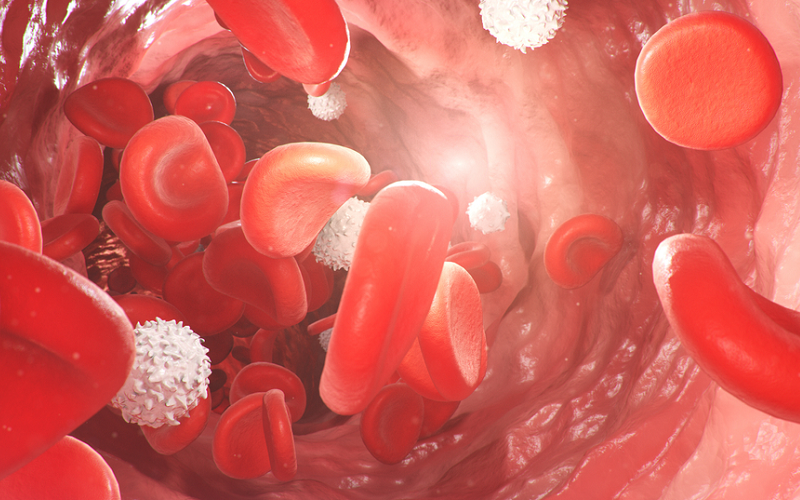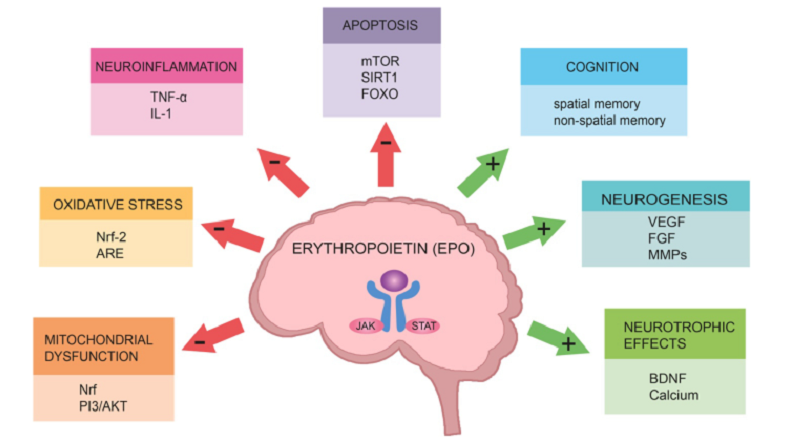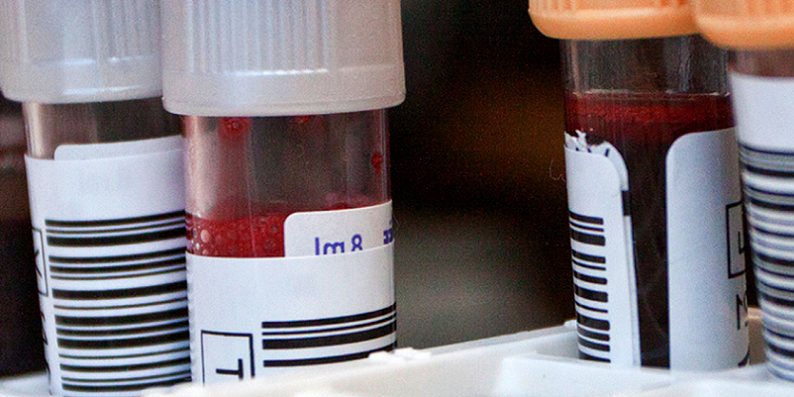
Erythropoietin (EPO), a hormone better known for its crucial role in red blood cell production, has recently emerged as a beacon of hope in the realm of brain and cognitive health. Here we explore the multifaceted world of EPO, venturing far beyond its traditional hematological roles. We unveil the lesser-known yet equally significant impact of EPO on neural protection and cognitive functions, dissect cutting-edge research, unravel the complex mechanisms of action, and ponder over its therapeutic potential in tackling various neurological disorders.
Contents
Understanding Erythropoietin (EPO)
Erythropoietin (EPO) is a hormone that, while well-known for its role in hematopoiesis, has a broader biological significance that often goes unrecognized. To appreciate its emerging roles in neural protection and cognitive health, we first need to explore its basic biology and traditional functions.
Definition and Biological Role of Erythropoietin (EPO)
Erythropoietin, a glycoprotein hormone, is primarily produced in the kidneys and, to a lesser extent, in the liver. It plays a pivotal role in the body’s regulation of red blood cell production, known as erythropoiesis. EPO is released in response to hypoxia, or low oxygen levels, in the body’s tissues. It binds to erythropoietin receptors on red blood cell precursors in the bone marrow, stimulating their proliferation and maturation. This process is vital for maintaining adequate oxygen transport throughout the body, ensuring all organs, including the brain, function optimally.
Production and Regulation of EPO
The synthesis and release of EPO are finely tuned by the body’s oxygen-sensing mechanisms. When oxygen levels drop, cells in the kidneys sense this change and increase EPO production. This response is a critical component of the body’s adaptation to hypoxic conditions, such as those experienced at high altitudes or during certain illnesses. Interestingly, EPO’s production is also influenced by various other factors, including certain cytokines and hormones, which further underscores its multifaceted role in the body’s homeostasis [1].
Traditional Roles of EPO in Red Blood Cell Production
EPO’s primary function in red blood cell production is vital for life. By stimulating the division and differentiation of erythroid progenitor cells in the bone marrow, EPO ensures a steady supply of red blood cells, which are essential for transporting oxygen from the lungs to the rest of the body.
This process is crucial not only for physical performance and endurance but also for the overall health of all bodily tissues, including the brain. Without adequate EPO activity, individuals can develop anemia, leading to fatigue, weakness, and a host of other health issues.
EPO and the Brain
While Erythropoietin (EPO) is traditionally associated with red blood cell production, recent research has illuminated its significant impact on the brain.
EPO Receptors in the Brain
EPO receptors (EPOR) are not exclusive to red blood cell precursors; they are also present in the brain, particularly in regions associated with memory and learning, such as the hippocampus and cerebral cortex. The discovery of these receptors opened a new frontier in neuroscience, suggesting that EPO could directly influence brain function. In the brain, EPO binds to these receptors, triggering a cascade of intracellular events that contribute to cell survival, neuroplasticity, and potentially, cognitive enhancement [2].
The Neuroprotective Effects of EPO
The neuroprotective roles of EPO are of immense interest to researchers. Studies have shown that EPO can protect neurons from a variety of harmful conditions, including oxidative stress, inflammation, and apoptosis (programmed cell death), which are common pathways in many neurodegenerative diseases. EPO’s ability to cross the blood-brain barrier further enhances its potential as a therapeutic agent, offering direct benefits to the brain’s cellular environment.
EPO’s Role in Cognitive Functions
Beyond its neuroprotective effects, EPO appears to play a role in enhancing cognitive functions. Research indicates that EPO can improve learning and memory in various experimental models. It is thought to do so by promoting synaptic plasticity, the process by which neural connections are strengthened or weakened over time, which is fundamental to learning and memory. These findings suggest that EPO could have therapeutic implications for conditions characterized by cognitive impairment, such as Alzheimer’s disease and other forms of dementia.

EPO and Neural Protection Research Highlights
The burgeoning interest in erythropoietin (EPO) and its effects on the brain has led to a wealth of research, uncovering its potential in various neurological conditions.
Key Studies on EPO and Neural Protection
Several landmark studies have illuminated the protective role of EPO in the nervous system. For instance, research has shown that EPO can mitigate damage caused by cerebral ischemia (lack of blood flow to the brain), which is a major cause of stroke. In animal models, EPO administration before or after a stroke significantly reduced brain damage and improved outcomes. Similarly, EPO has been found to offer protection against spinal cord injury and certain neurotoxic injuries, suggesting its broad potential in neural protection [3].
EPO in Neurodegenerative Diseases
EPO’s role in neurodegenerative diseases has been a focal point of recent research. Studies indicate that EPO can slow the progression of diseases like Alzheimer’s and Parkinson’s, primarily through its neuroprotective and anti-inflammatory actions. In models of Alzheimer’s disease, EPO has been shown to reduce amyloid-beta accumulation, a hallmark of the disease, and improve cognitive performance. Similarly, in Parkinson’s disease models, EPO administration resulted in reduced neurodegeneration and better motor function.
EPO in Brain Injury and Recovery
Research on EPO’s efficacy in brain injury and recovery has yielded promising results. In cases of traumatic brain injury (TBI), EPO has demonstrated potential in reducing brain swelling and improving neurological outcomes. Additionally, its role in promoting neurogenesis and angiogenesis (formation of new neurons and blood vessels, respectively) suggests that EPO could aid in the recovery and rehabilitation process following brain injuries.
These research highlights underscore the versatility of EPO as a neuroprotective agent. While the studies present compelling evidence of its potential, ongoing research is crucial to fully understand the mechanisms involved and to translate these findings into effective clinical treatments [4].

EPO Mechanisms of Action
The therapeutic potential of Erythropoietin (EPO) in neural protection is closely tied to its complex mechanisms of action within the brain. Understanding these mechanisms is crucial for developing targeted treatments for various neurological conditions.
EPO’s Role in Cellular and Molecular Pathways
EPO influences a multitude of cellular and molecular pathways that contribute to its neuroprotective effects. Upon binding to its receptors on neural cells, EPO activates intracellular signaling cascades, including the Janus kinase 2 (JAK2)/signal transducer and activator of transcription 5 (STAT5) pathway.
This activation leads to the transcription of genes that promote cell survival and reduce apoptosis. Additionally, EPO modulates the activity of neurotransmitters and growth factors, which play a critical role in neuroplasticity and neuron survival [5].
EPO’s Anti-inflammatory Effects in the Brain
Inflammation is a common pathological feature in many neurodegenerative diseases. EPO exhibits significant anti-inflammatory effects in the brain, which contribute to its neuroprotective properties. It reduces the production of pro-inflammatory cytokines and inhibits the activation of microglia, the brain’s primary immune cells. By mitigating neuroinflammation, EPO helps preserve neural function and integrity, especially in conditions like multiple sclerosis and Alzheimer’s disease.
EPO and Neurogenesis
One of the most exciting aspects of EPO’s action in the brain is its potential to promote neurogenesis – the creation of new neurons. EPO has been shown to stimulate neural progenitor cells and enhance their differentiation into mature neurons. This ability to foster new neural growth is particularly significant in the context of brain injury and neurodegenerative diseases, where neuron loss is a major concern.
References
[1] Erythropoietin: Production, Purpose, Test & Levels
[2] EPO – Overview: Erythropoietin, Serum
[3] Erythropoietin – an overview
[4] The Many Facets of Erythropoietin Physiologic and Metabolic Response
[5] Erythropoietin Stimulating Agents

